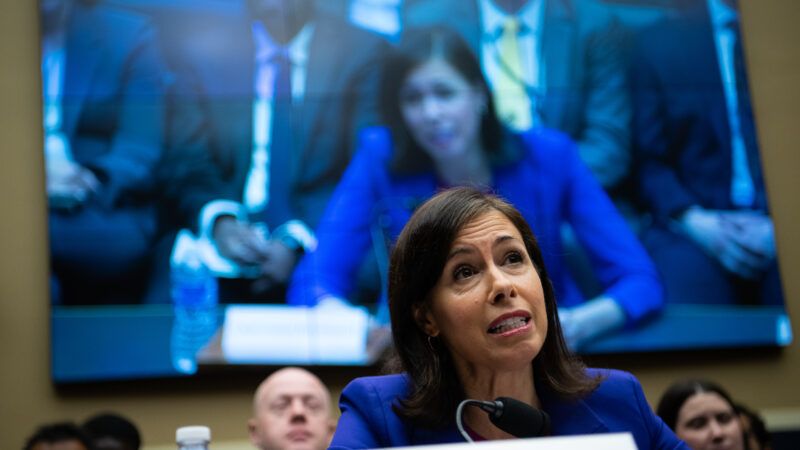New Net Neutrality Rules Could Threaten Popular Services
FCC Chair Jessica Rosenworcel has initiated a new rulemaking that would enact what are largely the same net neutrality rules tried back in 2016.

Net neutrality regulations have been dead for years. They should stay that way.
Unfortunately, the Federal Communications Commission (FCC) has moved to reopen and relitigate the issue.
Net neutrality boosters believe we need strict laws to keep internet service providers (ISPs) from prioritizing, slowing down, or blocking specific types of content, such as an application or a website. Such rules were enacted in 2016, under the Obama administration. They were removed after Donald Trump's FCC chair, Ajit Pai, brokered a 2017 agreement with the Federal Trade Commission (FTC) to address potential harms caused by ISPs while simultaneously repealing strict net neutrality laws.
This was a good outcome. The FCC would serve as the expert on broadband, and the FTC would bring cases when consumers were harmed. Consumers got protection, and the FCC was prevented from adding another layer of bureaucracy (and from grabbing regulatory powers that Congress never granted it).
But now FCC Chair Jessica Rosenworcel has initiated a new rulemaking. It would enact what are largely the same net neutrality rules tried back in 2016.
A lot has happened since then. Since we last had this debate, Mark Zuckerberg went in front of Congress for the first time, the Cambridge Analytica story broke, we had the COVID shutdowns and the switch to online life, there was a riot at the Capitol, the Parler app was booted by its infrastructure providers, and we learned about the government's involvement in taking down lab-leak posts.
The law has changed and markets have changed, and yet the arguments for and against net neutrality have largely remained the same. Then as now, the strongest argument against the rules is that it puts services that people love under FCC scrutiny.
These new rules could, for example, put T-Mobile's Binge On package on the chopping block. This deal exempts YouTube, Netflix, Hulu, HBO, Sling, ESPN, SHOWTIME, Starz, and other content from counting toward the data cap on all T-Mobile phone plans. The FCC never liked this plan and might go after it again.
Cox Communications' "Elite Gamer" service could also be cut. This service is advertised to gamers who want quick reaction times from the Internet. Since 2019 Cox has offered this package for $15 a month, but it could face FCC scrutiny under these rules because it provides prioritized service.
Fortunately, net neutrality rules are not likely to survive legal scrutiny this time around, thanks to a 2021 Supreme Court decision.
In West Virginia v. EPA, the Court relied on the so-called major questions doctrine to make it more difficult for agencies to expand their power. Unless Congress has granted it explicit, clear-cut authority, the Court said, an agency cannot regulate a major economic or political issue.
This probably applies to net neutrality. Two Obama-era solicitor generals didn't equivocate in a recent legal brief on the issue, saying such FCC rules "will not survive a Supreme Court encounter with the major questions doctrine."
Just as the commission is facing a tougher court, it will also face a tougher court of public opinion. Net neutrality was meant to stop ISPs from limiting content. But several years after repeal, it feels like it's everyone other than ISPs that actually limited content.
While the companies were well within their rights to deny service, there was a dramatic cascade by infrastructure providers and platforms in the days just after the Capitol riot. When it came out that some organizing for January 6 had taken place on Parler, Google dropped the social network from the Google Play Store, contending that its lack of "moderation policies and enforcement" posed a "public safety threat." Then Apple dropped it too, and then Amazon Web Services and DigitalOcean cut ties with Parler as well, effectively taking the app off the web.
Just last year, Cloudflare, which provides various services to help websites perform better, dumped protection of Kiwifarms. (The online forum was blamed for a wave of harassment against trans activists, though this version of events has been disputed.) The site was immediately opened to cyberattacks, and like Parler, Kiwifarms also went offline.
It turns out half the Internet has a single point of failure, and it's called Cloudflare.
And although there is justified concern about the power of platforms, the real threat of censorship still comes from the government. In Missouri v. Biden, handed down on July 4, a federal judge basically blocked key officials in the surgeon general's office, the Centers for Disease Control and Prevention, and the Federal Bureau of Investigation from contacting tech companies. Turns out that federal law enforcement has been using encrypted and self-deleting apps to communicate about "misinformation" and content removal.
When net neutrality was introduced, people feared that ISPs would become a major source of censorship. That hasn't happened. Why revive the rules now?


Show Comments (47)